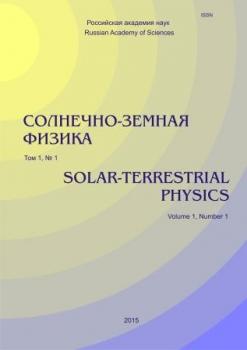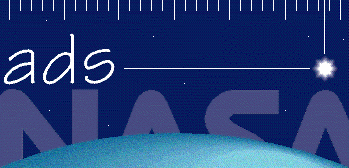from 01.01.1975 to 01.01.2021
Irkutsk, Irkutsk region, Russian Federation
Irkutsk, Russian Federation
Irkutsk, Russian Federation
Ulaanbaatar, Mongolia
Paratunka, Kamchatka, Russian Federation
Sodankyulya, Finland
Irkutsk, Russian Federation
Apatity, Russian Federation
Apatity, Russian Federation
Irkutsk, Russian Federation
It is shown that a diamagnetic structure (DS) of the slow solar wind (SW), the source of which on the Sun was a chain of streamers, arrived at Earth’s orbit on December 22, 2015. It interacted with Earth’s magnetosphere under conditions when the northward Bz component of the interplanetary magnetic field (IMF) remained for a long time in preceding undisturbed SW. The interaction and a sharp change in the direction of Bz to the south generated an isolated substorm whose duration depends on the duration of interaction with the DS. The substorm began at midday with the passage of the DS into the magnetosphere and spread to the east. All phases of the substorm — growth, expansion, and recovery — were observed for two hours. Variations in the SW and IMF parameters are shown to coincide for the isolated substorm whose energy source was the slow solar wind DS, and a trigger was the abrupt change in the direction of the vertical IMF component from north to south. The coincidence is justified by statistical generalizations of the same parameters in 40 % of cases of long-term observations of individual substorms whose trigger was a change in Bz direction.
diamagnetic structure, global isolated substorm, change in the Bz direction, trigge
1. Akasofu S.-I. Auroral substorms: search for processes causing the expansion phase in terms of the electric current approach. Space Sci Rev. 2017, vol. 212. pp. 341-381. DOI:https://doi.org/10.1007/s11214-017-0363-7.
2. Borrini G., Wilcox J.M., Gosling J.T., Bame S.J., Feldman W.C. Solar wind helium and hydrogen structure near the heliospheric current sheet; a signal of coronal streamer at 1 AU. J. Geophys. Res. 1981, vol. 86, p. 4565.
3. Dmitriev A.V., Suvorova A.V. Large-scale jets in the magnetosheath and plasma penetration across the magneto-pause: THEMIS observations. J. Geophys. Res.: Space Phys. 2015, vol. 120, iss. 6. DOI:https://doi.org/10.1002/2014JA020953.
4. Echim M.M., Lemaire J.F. Laboratory and numerical simulations of the impulsive penetration mechanism. Space Sci. Rev. 2000, vol. 92, pp. 56-601.
5. Eselevich V.G. Solar flares: geoeffectiveness and the possibility of a new classification. Planet. Space Sci. 1990, vol. 38, iss. 2, pp. 189-206. DOI:https://doi.org/10.1016/0032-0633(90)90083-3.
6. Eselevich V.G., Fainshtein V.G. The heliospheric current sheet (HCS) and high-speed solar wind: interaction effects. Planet. Space Sci. 1991, vol. 39, pp. 737-744. DOI:https://doi.org/10.1016/0032-0633(91)90163-5.
7. Eselevich M.V., Eselevich V.G. Fractal structure of the heliospheric plasma sheet at the Earth’s orbit. Geomagnetizm i aeronomiya [Geomagnetism and Aeronomy]. 2005, vol. 45, no. 3, pp. 326-336.
8. Eselevich V.G., Fainshtein V.G., Rudenko G.V. Study of the structure of streamer belts and chains in the solar corona. Solar Phys. 1999, vol. 188, pp. 277-297. DOI:https://doi.org/10.1023/A:1005216707272.
9. Eselevich M., Eselevich V., Fujiki K. Streamer belt and chains as the main sources of quasi-stationary slow solar wind. Solar Phys. 2007, vol. 240, pp. 135-151. DOI:https://doi.org/10.1007/s11207-006-0197-z.
10. Gjerloev J.W. The SuperMAGdata processing technique. J. Geophys. Res. 2012, vol. 117, iss. A9, A09213. DOI:https://doi.org/10.1029/2012JA017683.
11. Hsu T.-S., McPherron R.L. Occurrence frequencies of IMF triggered and nontriggered substorms. J. Geophys. Res. 2003, vol. 108, iss. A7, 1307. DOI:https://doi.org/10.1029/2002JA009442.
12. Kangas J., Guglielmi A., Pokhotelov O. Morphology and physics of short-period magnetic pulsations (A Review). Space Sci. Rev. 1998, vol. 83, pp. 435-510. DOI:https://doi.org/10.1023/A:1005063911643.
13. Karlsson T., Kullen A., Liljeblad E., Brenning N., Nilsson H., Gunell H., Hamrin M. On the origin of magnetosheath plasmoids and their relation to magne-tosheath jets. J. Geophys. Res.: Space Phys. 2015, vol. 120, iss. 9, pp. 7390-7403. DOI:https://doi.org/10.1002/2015JA021487.
14. Katsavriasi C., Rapits S., Daglis L.A., Karlsson T., Georgiou M., Balasis G. On the generation of Pi2 pulsations due to plasma flow patterns around magnetosheath jets. Geophys. Res. Lett. 2021, vol. 48, iss. 15, e2021GL093611. DOI:https://doi.org/10.1029/2021GL093611.
15. Kepko L., McPherron R.L., Amm O., Apatenkov S., Baumjohann W., Birn J., Lester M., Nakamura R., Pulkkinen T.I., Sergeev V. Substorm current wedge revisited. Space Sci. Rev. 2015, vol. 190, pp. 1-46. DOI:https://doi.org/10.1007/s11214-014-0124-9.
16. Lemaire J., Roth M. Differences between solar wind plasmoids and ideal magnetohydrodynamic filaments. Planet. Space Sci. 1981, vol. 29, iss. 8, pp. 843-849.
17. McPherron R.L., Terasawa T., Nishida A.J. Solar wind triggering of substorm expansion onset. J. Geomag. Geoelectr. 1986, vol. 38, iss. 11, pp. 1089-1108. DOI:https://doi.org/10.5636/jgg.38.1089.
18. Nishida A. Geomagnitnyi diagnoz magnitosfery [Geomagnetic Diagnosis of the Magnetosphere]. M.: Mir, 1980, 222 p. (In Russian).
19. Parkhomov V.A., Borodkova N.L., Eselevich V.G., Eselevich M.V. Abrupt changes of density in sporadic solar wind and their effect on Earth magnetosphere. Cosmic Research. 2015, vol. 53, no. 6, pp. 411-422. DOI:https://doi.org/10.1134/S0010952515050093.
20. Parkhomov V.A., Borodkova N.L., Eselevich V.G., et al. Solar wind diamagnetic structures as a source of substorm - like disturbances. J. Atmos. Solar-Terr. Phys. 2018, vol. 181, pp. 55-67. DOI:https://doi.org/10.1016/j.jastp.2018.10.010.
21. Parkhomov V.A., Eselevich V.G., Eselevich M.V., Dmitriev A.V., Suvorova A.V., Vedernikova T.I. Slassification of magnetospheric responses to interaction with diamagnetic structures of slow solar wind. Solar-Terr. Phys. 2020, vol. 6, iss. 4, pp. 24-36. DOI:https://doi.org/10.12737/stp-64202004.
22. Parkhomov V.A., Eselevich V.G., Eselevich M.V., Dmitriev A.V., Suvorova A.V., Khomutov S.Yu., Tsegmed B., Tero Raita. Magnetospheric response to the interaction with the sporadic solar wind diamagnetic structure. Solar-Terr. Phys. 2021, vol. 7, iss. 3, pp. 11-28. DOI:https://doi.org/10.12737/stp-73202102.
23. Pneuman G.W. Ejection of magnetic fields from the sun-Acceleration of a solar wind containing diamagnetic plasmoids. Astrophys. J. 1983, vol. 265, pp. 468-482.
24. Rakhmatulin R.A., Parkhomov V.A., Lukovnikova V.I. On the appearance of Pi pulsations in the preliminary phase of a substorm. Magnitosfernye issledovaniya [Magnetosphere research]. 1984, no. 5, pp. 111-120. (In Russian.)
25. Saito T. Geomagnetic pulsations. Space Sci. Rew. 1969. vol. 10, iss. 3, pp. 319-412.
26. Schwenn R., Dal Lago A., Huttunen E., Gonzalez W.D. The association of coronal mass ejections with their effects near the Earth. Ann. Geophys. 2005, vol. 23, pp. 1033-1059. DOI:https://doi.org/10.5194/angeo-23-1033-2005.
27. Svalgaard L.J., Wilcox W., Duvall T.L. A model combining the solar magnetic field. Solar Phys. 1974, vol. 37, p. 157.
28. Troshichev O.A, Janzhura A. Space Weather Monitoring by Ground-Based Means: PC Index. Springer-Verlag, 2012, 287 r. DOI:https://doi.org/10.1007/978-3-642-16803-1.
29. Vorobjev V.G., Antonova E.E., Yagodkina O.I. How the intensity of isolated substorms is controlled by the solar wind parameters. Earth, Planets and Space. 2018, vol. 70, p. 148. DOI:https://doi.org/10.1186/s40623-018-0922-5.
30. Wang Y.M., Sheeley N.R., Rich N.B. Coronal pseudostreamers. Astrophys. J. 2007, vol. 685, no. 2. pp. 1340-1348. DOI:https://doi.org/10.1086/511416.
31. Yahnin A.G., Titova E.E., Demekhov A.G., Yahnina T.A., Popova T.A., Lyubchich A., Manninen J., Raita T. Simultaneous observations of EMIC waves, ELF/VLF waves, and energetic particle precipitation during multiple compressions of the magnetosphere. Geomagnetism and Aeronomy. 2019, vol. 59, iss. 6, pp. 668-680. DOI:https://doi.org/10.1029/2008JA013099.
32. Yahnina T.A., Frey H.U., Bösinger T., Yahnin A.G. Evidence for subauroral proton flashes on the dayside as the result of the ion cyclotron interaction. J. Geophys. Res.: Space Phys. 2008, vol. 113, iss. A7. DOI:https://doi.org/10.1029/2008JA013099.
33. URL: https://space.fmi.fi/image/www/index.php?page=il_ index (accessed February 15, 2022).
34. URL: http://carisma.ca/carisma-data/fgm-auroral-indici (accessed February 15, 2022).
35. URL: http://cdaweb.gsfc.nasa.gov/cgi-bin/eval2.cgi (accessed February 15, 2022).
36. URL: http://wdc.kugi.kyoto-u.ac.jp/dst_provisional/201512 /index.html (accessed February 15, 2022).
37. URL: http://www.obsebre.es/en/rapid (accessed February 15, 2022).
38. URL: https://cdaw.gsfc.nasa.gov/CME_list (accessed February 15, 2022).
39. URL: http://bdm.iszf.irk.ru (accessed February 15, 2021).
40. URL: http://spaceweather.ru/ru/node/32 (accessed February 15, 2022).
41. URL: http://ckp-rf.ru/ckp/3056 (accessed February 15, 2022).


















